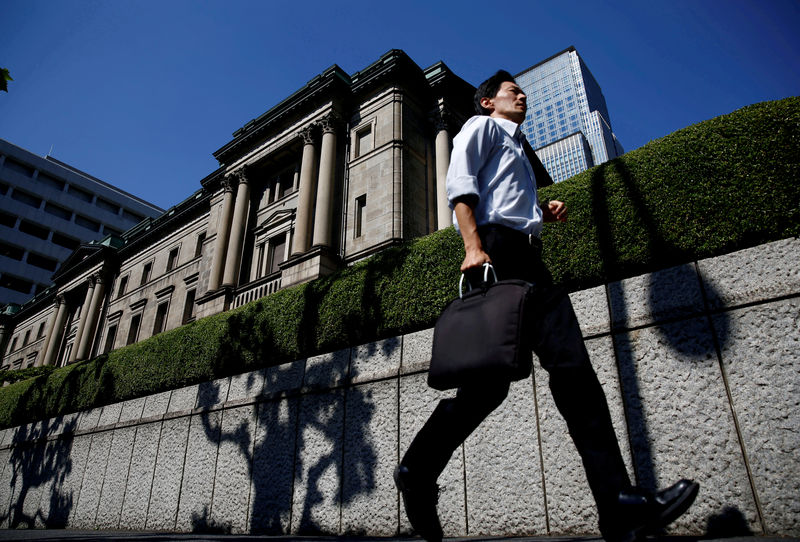By Leika Kihara
TOKYO (Reuters) - As the fallout from the U.S.-China trade war broadens, Bank of Japan policymakers are more open to discussing the possibility of expanding stimulus at their board meeting on Sept 18-19, sources familiar with their thinking say.
Increasing signs of a slowdown in global demand have made Japanese central bankers less confident about an early pickup in global growth, but their decision on whether or not to take further action to deal with it will be a close call for a divided board.
They may not reach a conclusion until the last minute as they scrutinize the market reaction to expected monetary easing steps by the European Central Bank and the U.S. Federal Reserve.
A dearth of policy options could complicate the debate at the meeting, which will follow the ECB's policy announcement on Sept. 12 and that of the Fed on Sept. 18.
"The pickup in global growth is taking longer than expected, which could affect Japan's output gap and hurt domestic demand," one of the sources said. "If risks to Japan's economy are deemed too high, there's a chance the BOJ may act," the source said, a view echoed by two other sources.
Deepening negative interest rates will be among key options if the BOJ were to ease, although the central bank may need to accompany that with measures to mitigate the pain any such move could inflict on financial institutions, the sources said.
"The BOJ's current policy framework targets interest rates, so it makes logical sense to consider moving around the targets first," said a source familiar with its thinking.
Another source, however, said other options were not off the table, and that it is likely the next move would depend on what kind of risks the BOJ is trying to battle.
Under a policy dubbed yield curve control (YCC), the BOJ guides short-term rates toward -0.1% and the 10-year government bond yield to around 0%. It also buys government bonds and risky assets in a bid to achieve its elusive 2% inflation target.
The BOJ has said it has four tools to ease: Deepening negative rates, cutting the 10-year yield target, ramping up its buying of risky assets or printing money at a faster pace.
At its rate review in July, the BOJ pledged to ramp up stimulus "without hesitation" to prevent risks from knocking it off its path toward its 2% inflation target.
Concerns about the global economy have grown since then, with the United States slapping additional tariffs on China and fears of a no-deal Brexit escalating.
A recent slew of weak data from China and Europe has added to BOJ policymakers' worries that global growth may not pick up soon enough to offset the impact on consumption of a scheduled sales tax hike in October, the sources said.
But there is no consensus yet at the BOJ over how quickly it should ease and what tools to deploy. While the trade war is hurting business sentiment and exports, consumption is holding up and non-manufacturers' appetite for spending remains healthy.
The nine-member board is also divided between those who see room to expand stimulus and those who fret about the rising cost of prolonged easing such as the strain that years of ultra-low rates is putting on financial institutions' profits.
The final decision will depend much on how worried each board member is about the risks to Japan's recovery, and how they view the balance of costs and benefits of additional easing, the sources said.
Slumping bond yields and signs of a possible global recession mean the BOJ has to perform a balancing act: It must keep pumping out money aggressively to spur growth, but also prevent borrowing costs from sliding too far below its target.
In a recent interview with the Nikkei newspaper, BOJ Governor Haruhiko Kuroda said taking rates deeper into negative territory was among its options if the bank were to ease. He also said super-long yields have fallen "a bit too far," signaling the bank's desire to prevent the yield curve from flattening too much.
A flat yield curve erodes the profit that financial institutions earn from borrowing cheap short-term funds and lending them long-term with a margin.
Expanding stimulus without pushing down long-term borrowing costs would be no easy task, particularly when global recession fears have been pushing down bond yields across the world.
One idea could be to communicate more clearly the BOJ's resolve to battle any unwelcome decline in super-long yields via slower bond purchases, the sources said.
"There are various things we can do, such as combining various tools or enhancing them," Kuroda said in the Nikkei interview, suggesting any future move may involve a mix of measures rather than a single step.
